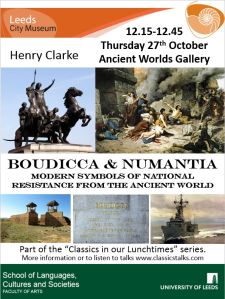
In this talk Henry Clarke (Teaching Fellow in Roman History and Culture, University of Leeds) drew links between his teaching on Ancient Empires and the Roman World and his research into local responses to the Roman Empire.
He looked specifically at tales of resistance by non-Romans to either the advances of the Empire or of Roman power and control. Boudicca is perhaps the best known example of ‘British’ resistance to Rome, whilst the fate of the pre-Roman city of Numantia in Spain is a strong example of an ancient event that has been adapted to serve as a Modern Spanish symbol of the nation and its power to defend itself.
He began by outlining classical literary accounts of Boudicca and Numantia, before exploring how their stories have been adopted and adapted over the centuries into the National Symbols we see today.
Resistance talk Handout (pdf download, 1893kB)
Henry has previously talked about Ancient and Modern Rowing (link to the page with the uploaded talk).

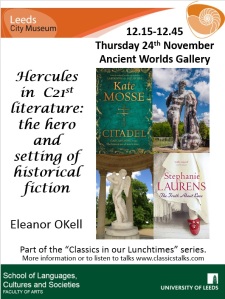
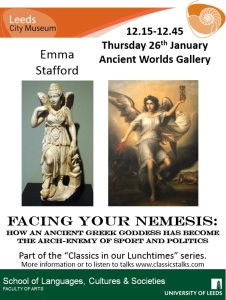
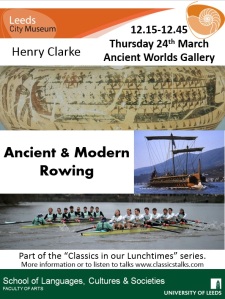 this talk, Henry Clarke, both Classicist at the University of Leeds and rowing coach at Leeds Rowing Club, combined his two passions to explore the links between rowing in the ancient and modern worlds. For the ancient world powers in Egypt, Greece and Rome, rowing was a fundamental means of transportation and warfare. The Trireme in particular required a high degree of skill and precision to ensure over 150 rowers would respond to orders instantly and as one body. Although the sporting aspect of rowing has been attributed to 17th Century England, frequent training exercises and racing competitions were considered essential for guaranteeing an effective crew by the Roman navy. The same goes for today’s competitive rowing clubs.
this talk, Henry Clarke, both Classicist at the University of Leeds and rowing coach at Leeds Rowing Club, combined his two passions to explore the links between rowing in the ancient and modern worlds. For the ancient world powers in Egypt, Greece and Rome, rowing was a fundamental means of transportation and warfare. The Trireme in particular required a high degree of skill and precision to ensure over 150 rowers would respond to orders instantly and as one body. Although the sporting aspect of rowing has been attributed to 17th Century England, frequent training exercises and racing competitions were considered essential for guaranteeing an effective crew by the Roman navy. The same goes for today’s competitive rowing clubs.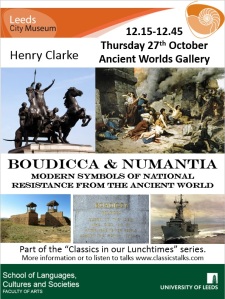
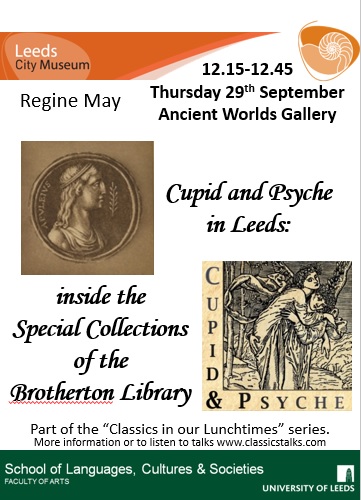 This talk will explore a number of works inspired by Apuleius’ story of Cupid and Psyche that can be found in the Brotherton Library’s Special Collections. Ranging from plays to novels, from operas to book illustrations, this cultural legacy covers the history of the reception of the story from 1511 to 1922 and items from it are being digitised with explanatory notes in an
This talk will explore a number of works inspired by Apuleius’ story of Cupid and Psyche that can be found in the Brotherton Library’s Special Collections. Ranging from plays to novels, from operas to book illustrations, this cultural legacy covers the history of the reception of the story from 1511 to 1922 and items from it are being digitised with explanatory notes in an